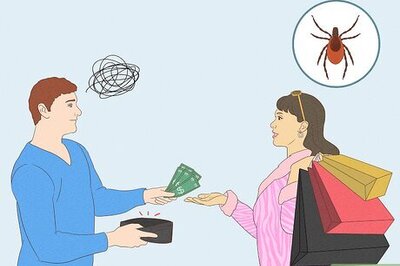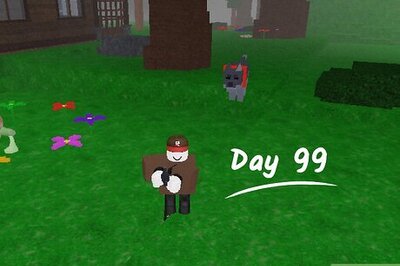
views
Actor Shatrughan made his political debut via Opposition ranks, but had former Prime Minister Indira Gandhi lived a bit longer, ‘Shotgun’ Sinha would have been a part of the Congress almost four decades ago.
Sinha is set to join the Congress on April 6 and contest Lok Sabha elections from Patna Sahib as party nominee against BJP leader and Union minister Ravi Shankar Prasad.
Speaking at Shastrarth — an initiative by ex-diplomat-turned-parliamentarian Pavan K Verma, art collector Nita Khanna and painter Manish Pashkale, Sinha told me about his frequent meetings with Indira Gandhi in early 1980s.
“She was extremely fond of me and frequently granted me appointments. She had plans for me," Sinha said while describing Indira Gandhi as the greatest woman politician. “I would have been in the Congress had she lived on," Sinha had remarked.
Unlike most actors who joined politics at a later stage of their lives, Sinha holds a distinction of being political most of his life.
A good fifteen years before he formally joined the Bharatiya Janata Party in 1992, Sinha had already cut his political teeth, involving himself in the movement spearheaded by veteran freedom fighter Jai Prakash Narayan against the then prime minister, Indira Gandhi. The year was 1975 and Gandhi had declared a state of emergency across the country.
Sinha would unreservedly acknowledge that JP was a man who had influenced him deeply. So much so, that in his later years, the actor had no hesitation in attributing to him his very association with politics.
Given his faith in the man and the political situation of the time, the mid-1970s presented an opportune moment for the flamboyant Sinha to infuse the JP movement in his native state with a certain dose of glamour.
He had already become the most famous Bihari youth icon of his time by virtue of the unparalleled fame he had earned in Indian cinema as an anti-hero whose performances, more than the hero’s, generated a good deal of excitement in the theatres, evident in the enthusiastic whistling and thundering applause with which his on-screen entry was greeted by the audience.
As JP’s follower, he also befriend the movement’s prominent student leaders in the state — Nitish Kumar, Lalu Prasad Yadav among others — all key players in Bihar politics today, whose amicable relations with Sinha remain intact.
With his film career on a high, Sinha had wisely avoided taking a direct plunge into politics, choosing to wait patiently on the sidelines, instead, until the film offers began drying up.
Since his initial involvement in politics had been defined by an anti-Congress stance, Shatrughan Sinha had two options before him when he finally decided to join a political party: declare his allegiance to the Mandal-inspired Janata Dal, which laid claim to the JP movement’s legacy, or ride the Kamandal bandwagon of the BJP that was growing increasingly stronger under LK Advani.
Though the actor was not a Hindutva zealot, but more in the mould of Atal Bihari Vajpayee, he opted for the BJP.
There were, presumably, other reasons for his choice: firstly, he belonged to an influential Kayastha family that was not a core constituency of the OBC-dominated Janata Dal; and secondly, having become a national icon by virtue of his successful career in films, he thought it wise to join a political party with wider national appeal.
Sinha was, in fact, the first actor to enter politics by formally joining the Opposition party and for over two decades, he managed to retain his clout in the BJP, that too on his own terms.
He could afford to avoid mouthing Hindutva platitudes, even in the heady days of the Ram Janmabhoomi agitation, and got away with praising his friends in rival political parties — be they old buddies from the film industry, like the late Sunil Dutt (for whom he would express his admiration quite openly, referring to him as his elder brother), Rajesh Khanna and Raj Babbar, or those he knew well from the other extreme of the political spectrum, such as Lalu Prasad Yadav and Nitish Kumar.
When the BJP fielded him in 1992 against Congress candidate and co-star Rajesh Khanna in the New Delhi Lok Sabha by-election, Sinha attacked the rival party fiercely in his campaign speeches, but spared the candidate. To date, he maintains that he values personal relations over political rivalry.
He even went and met Sonia Gandhi at her residence, along with Congress leader Kamal Nath, amidst speculation of his defection from the BJP, pooh-poohing the rumours that eventually turned out to be just that — rumours. Sources said Sinha had attended an iftar hosted by Sonia, where he narrated some anecdotes about Rajiv Gandhi. Sonia subsequently invited him for a cup of tea.
Speaking at the Bangalore Literary Festival in December 2016, Sinha confessed to being a ‘huge admirer’ of Sonia Gandhi. Asked to comment on women politicians among the current crop he appreciated the most, Sinha told the audience, “I hugely admire her. I admire how she has conducted herself in public life and how she brought her kids up."
Sinha has been an astute weathercock, mostly siding with the winning side. He was among first few to back Modi.
In February 2013, when the BJP was witnessing a brief and unofficial tussle between Sinha’s mentor Advani and the then Gujarat Chief Minister Narendra Modi over the choice of the party’s prime ministerial candidate for the 2014 Lok Sabha polls, Sinha had jumped the gun by declaring support to Modi.
In the process, he had completely disregarded a gag order issued by the then BJP national president Rajnath Singh.
The pro-Modi declaration was followed by a quick afterthought. By July 2013, the actor-turned-politician could be heard saying, “There could be no better person than Advani as he is the one who has contributed the maximum for the BJP. He should not be sidelined."
He went on to emphasise that is if Narendra Modi, “a friend and a popular face", is projected as a prime ministerial candidate after parliamentary board meeting, it would be “great", but “Advani must be at the helm of affairs".
In April 2014, barely a month before the Lok Sabha verdict, Sinha accurately predicted that the Modi-led BJP would get 300 seats (in the final tally, the BJP won 282 parliamentary seats on its own, while the combined strength of the NDA was 336).
The question that is doing the rounds in Delhi-Mumbai-Patna social circuits is whether Sinha’s affiliation to the Congress and Lalu Yadav, signals something about 2019 polls that most political commentators and pollsters seem missing?
(Rasheed Kidwai is a visiting Fellow with the Observer Research Foundation (ORF). Views are personal)


















Comments
0 comment